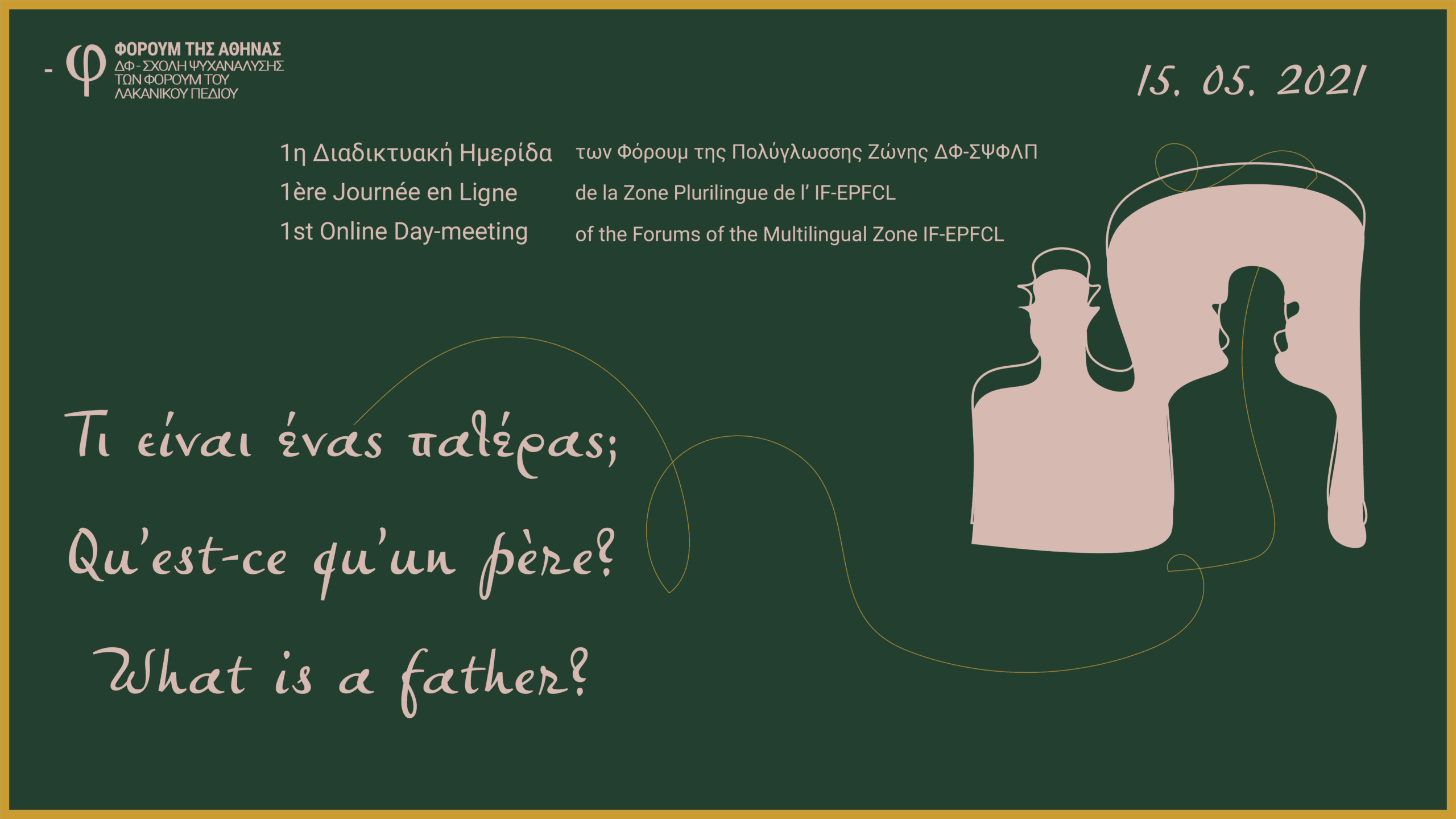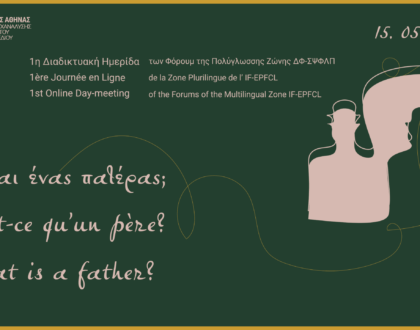Father, don’t you see I’m burning?

Predule FCL Athènes
1st online Day-Meeting of the Forums of the Multilingual Zone IF-EPFCL
“I cannot think of any need in childhood as strong as the need for a father’s protection.”
(Sigmund Freud, Civilization and its Discontents, Athens, Plethron, p. 24)
For Philip, Spyros, Glykeria, and Michael
Freud’s categorical statement, which I came across in “Civilization and its Discontents”, together with the highly worrying, self-reproaching conclusion of a troubled teenager’s father, the protagonist in an otherwise feebly scripted film I recently watched, that “a father who cannot protect his son is no father at all”, illuminated to me a certain direction I could follow, in my hopes of rising to the challenge of arranging this short text for the Forum of Athens, as a contribution to the question “what is a father?”.
The story of the invention of the father-protector, within Freudian mythology, is more or less familiar. Formed within the structures that comprise “Totem and Taboo” as well as “Moses and Monotheism”, it is inherently connected to the genealogy of law itself, granted that the totemic rules constitute precisely the very first system of laws. However, if law originates in the function of the father – a law based on the renouncement of the drive – this same function is what lays the foundations for the history of civilization itself:
“Under the influence of external conditions (…) it happened that the matriarchal structure of society was replaced by a patriarchal one. This naturally brought with it a revolution in the existing state of the law (…). This turning from the mother to the father, however, signifies above all a victory of spirituality over the senses, that is to say a step forward in culture, since maternity is proved by the senses whereas paternity is a surmise basedon a deduction and a premise.” [1].
It boils down to the antithesis between that which is and that which it ought to be, a distinction introduced in relation to the father. However, if law and civilization are established, this occurs a posteriori, insomuch as he is dead: as Lacan emphatically illustrates, the association of the signifier of the father, the creator of Law, to death – of his murder at the hands of the sons of the horde, to be precise – signals the moment of the emergence of debt, through which the subject is hereafter inscribed into Law, into the Symbolic. The symbolic father is, therefore, the dead father, an excellent “illustration” of which can be found in Dora’s dream, whose entire neurotic “scenography” announces how a father, even an impotent one, is always a father. If the allusion to the father comprises the bedrock for every form of religious faith, he is also the one who, “deserving of the love”, generously offers his protection to the child.
But exactly what protection is this? Certainly, it is the duty of every father (and of course of every mother or adult equally) to protect the young defenseless child from everyday malignancies, it would, however, be unnecessary (with the exception of certain extreme – and not so rare – cases) to focus on a rather self-evident, atavistic, paternal duty.
In one very insightful text, Badiou[2], by positing the question from the viewpoint of the son, writes that his fate, his destiny, is love, as an act negating murder, as so mediated by the Law. At least, that is how it so appeared. For, approaching the issue as a function of the mandates of a postmodern reality, the author confesses his qualms regarding both the father’s and the son’s fortune. Seen from the side of the latter, the father, either as a bearer of jouissance or as the representative of an external – anonymous – law, comprises a fragile image that allows for an equally uncertain identity for the son. The infamous juvenile gangs, hordes with no father, deprived of the “opportunity to appeal to a redeeming murder and to come to an authentic agreement between them”, seem doomed to a perpetual repetition, evidence of the death drive’s predominance.
The question of the paternal function appears, therefore, to be congenital to that of what it is that is inherited from generation to generation. If, indeed, “the true function of the Father is fundamentally to unite – and not to oppose – a desire to the Law” [3], this appears as the sole route for the humanization of the son, the singular form of protection a father can offer, his principal legacy, an invaluable gift for the next generations.
Castration writes Lacan, is bestowed from father to son. And since poets, as Freud highlighted early on, have always pioneered the conceiving of the encrypted, I would like to refer those of you who are not already familiar with the text, to Philip Roth’s autobiographical novel “Patrimony”. Here, as he tends to his dying father, the author discovers the content of his father’s true legacy:
“So this is my patrimony. And not because there was something symbolic in the process of cleaning, but precisely because there was none, because it was nothing more nor less from this precise, lived reality. This was my father’s legacy: not the money, or the tefillins, nor the shaving cup, but the shit.”[4]
There is no other endowment from a father to his son, than the handing over of his own symbolic castration, of his own inscription into the Law. And if I chose the dead child’s plea, that appears to the grieving father in his dream, as the title to this short text, it is because it encapsulates, in a heartbreaking manner, precisely what I attempted to articulate here. And maybe, just maybe, this plea contains something that is inherent in the father’s own, subjective, tragically experienced boundary.
Dionysios Bratis March, 2021
Translated by George Zafeiropoulos
[1]Freud S., Moses and Monotheism, Athens, Epicouros, p. 219-220.
[2]Badiou, A. The philosophy and the youth of the world, Αληthεια, 6:2011.
[3]Lacan, J. The subversion of the subject and the dialectic of desire, in Ecrits, W.W. Norton & Company, New York, 2006.
[4]Roth, Ph. Patrimony: A True Story, Vintage, 1996.

